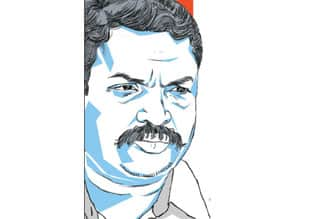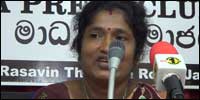தனித்து போட்டியிடக் கருதிப்பார்க்கிறோம்! - திருமாவளவன் சிறப்புச் செவ்வி
தி.மு.க.,வின் நீண்ட கால தோழமை கட்சியான, விடுதலை
சிறுத்தைகள் கட்சி, இன்றைய அரசியல் களத்தில் நெருக்கடியான கட்டத்தில்
நிற்கிறது. ஐந்து கேட்ட இடத்தில், ஒரு தொகுதி மட்டும் கொடுத்து, உடன்பாடு
செய்துள்ளதற்கு எதிர்ப்பு தெரிவித்து, ஊரெங்கும் வி.சி., தொண்டர்கள் குரல்
கொடுத்துக் கொண்டிருக்கும் நிலையில், இந்த தேர்தலை எப்படி சந்திக்கப்
போகிறோம் என்ற, கவலை படர்ந்த முகத்தோடு காணப்பட்ட, அக்கட்சி தலைவர்
திருமாவளவன், 'தினமலர்' நாளிதழுக்கு அளித்த பரபரப்பு பேட்டி:
ஒரு தொகுதி தான் என்றாகி விட்டது. போட்டியிடப் போவது யார்?
சிதம்பரம் தொகுதி என்பதால், நானே மீண்டும் போட்டியிடுவேன்.
எதை மையமாக வைத்து பிரசாரம் செய்வீர்கள்?
மதச் சார்பின்மை, சமூக நீதிப் பாதுகாப்பு என்ற அடிப்படையில், பொதுவான பிரசாரம் இருக்கும். பா.ஜ., - பா.ம.க., போன்ற ஜாதிய, மதவாத சக்திகள் ஒன்று சேர்ந்துள்ளன. இது, மதச்சார்பின்மை, சமூக நீதிக் கொள்கைக்கு ஆபத்தானது. தேசிய அளவிலும், இதை உயர்த்திப் பிடிக்கத் தேவை வந்துள்ளது. குறிப்பிட்ட பிரச்னைகள் என்றால், ஜெயங்கொண்டம் அனல்மின் பிரச்னை, நில இழப்பீடு விவகாரத்தை சொல்லலாம். இதில், எங்களால் முடிந்த அளவுக்கு நடவடிக்கைகள் எடுத்திருக்கிறோம். இன்னும் நிலுவை உள்ளது.வீராணம் ஏரியில் இருந்து சென்னைக்கு குடிநீர் வழங்குவதற்கு, அங்குள்ள விவசாயிகள் எதிர்ப்பு தெரிவிக்கின்றனர். சென்னைக்கு மாற்று குடிநீர் திட்டங்களை கொண்டு வந்து, வீராணம் ஏரியை பாதுகாக்க வேண்டும்.
அண்ணாமலை பல்கலைக்கழகத்தை அரசு ஏற்றுக் கொண்டது பற்றி?
இந்த நடவடிக்கையை வரவேற்கிறேன். பொதுவாக, கல்வி நிறுவனங்கள், அரசுடைமையானால், ஏழை எளிய மக்கள், குறைந்த கட்டணத்தில் கல்வி கற்க முடியும். இட ஒதுக்கீட்டை அமல்படுத்த முடியும்.
தலித் அல்லாத மக்கள் மத்தியில், உங்களுக்கு எதிராக, பா.ம.க., தலைவர் ராமதாஸ், தொடர் பிரசாரம் செய்து வருகிறார். அது பாதிப்பை ஏற்படுத்துமா?
இந்த பிரசாரம், தலித் அல்லாத மக்கள் மத்தியில் எடுபடவில்லை. ஏனென்றால், ஏற்கனவே எங்களுடன் தோழமையாக இருந்தபோது, 'அடுத்த பிரதமராக திருமாவளவன் வர வேண்டும்' என, மதுரையில், ராமதாஸ் பேசியிருக்கிறார். அந்தளவுக்கு எங்களை புகழ்ந்தவர், இன்று மாறிப் பேசுகிறார் என்றால், அது வெறும் அவதூறு தானே தவிர வேறில்லை.
அவர் அவதூறு பேச காரணம் என்ன?
அவரது கட்டுப்பாட்டில் நாங்கள் செயல்பட வேண்டும் என நினைத்தார். சட்டசபை தேர்தலில் கூட்டணியில் இருந்தோம். உள்ளாட்சி தேர்தலிலும் தொடர வேண்டும் என்றார். அதை நாங்கள் ஏற்கவில்லை என்பதில் தான் பிரச்னை வந்தது.
சரி... அதை முறியடிக்க போகிறீர்கள்?
அதை நாங்கள் கண்டுகொள்ளப் போவதில்லை. காரணம், பிற சமூகத்திற்கு எதிராக எந்த செயலிலும் நாங்கள் ஈடுபடவில்லையே.
அதற்காகவே, ராமதாஸ் ஒரு கூட்டணியே அமைத்திருக்கிறார். சமுதாய கூட்டணியான அதில், பிற சமூகத்தினர் இணைந்திருக்கிறார்களே?
எல்லா ஜாதிகளுக்கு உள்ளும் இடையிலும் உள்ள பிரச்னையை, குறிப்பிட்ட ஒரு இயக்கத்திற்கு எதிராக திருப்ப பார்க்கிறார்.
எதற்காகவாம்?
பொதுவாக எல்லா கட்சிகளும், தலித்துகள் தலித்துக்களாவே இருக்க வேண்டும் என விரும்புகின்றன.
அதன் வெளிப்பாடு தான், தி.மு.க.,வில் தொகுதி குறைப்பாக எதிரொலித்து உள்ளதா?
தெரியவில்லை. ஆனால், அதற்கு அவர்கள் நிறைய காரணங்கள் கூறுகின்றனர். போன முறை, விழுப்புரம் தொகுதி கொடுத்தோம்; அதில் தோற்று விட்டீர்கள் என்கின்றனர். வெறும் 2,797 ஓட்டில் தான் தோற்றோம்.
அந்த காரணம் நியாயமானதா?
நிச்சயமாக இல்லை.
ஏன் ஏற்றுக் கொண்டீர்கள்?
அதனால் தான் வருத்தத்தோடு ஒப்புக் கொள்கிறோம் என, அறிவாலயத்தில் அளித்த பேட்டியில் தெரிவித்தேன். ஜாதி, மதச்சார்பின்மையை பாதுகாக்க வேண்டும் என்ற அக்கறையிலும், தி.மு.க., கூட்டணியில் நீடிக்க விரும்புகிறோம். ஆனாலும், எங்களது கட்சியினரின் ஆதங்கத்தை எப்படி கட்டுப்படுத்த போகிறேன் எனத் தெரியவில்லை.
அதற்கு என்ன செய்யப் போகிறீர்கள்? தனித்து போட்டியிடுவீர்களா?
மாநில நிர்வாகிகள், மாவட்ட செயலாளர்களை அழைத்துள்ளேன். அவர்களிடத்தில், நிலைமையை தெளிவுபடுத்துவோம். முடிந்தளவுக்கு அவர்களை சமாதானப்படுத்த முயற்சிப்போம். அவர்களது கருத்தின் அடிப்படையில், பின்னர் முடிவு செய்வோம்.
போன முறை, 2 தொகுதிகள் கொடுத்தனர். இப்போது ஒன்றோடு நிறுத்தினர். ஒருவேளை, நீங்கள் வளரவில்லை என, தி.மு.க., நினைத்து விட்டதோ?
அப்படி நினைத்தால் அது தவறு. 20 லோக்சபா தொகுதிகளில், தலா 60 ஆயிரத்துக்கு குறையாமல் எங்களால் ஓட்டுக்கள் பெற முடியும். மீதம் இருபதில், குறைந்தபட்சம் 30 ஆயிரம் ஓட்டுக்கள் பெற முடியும். எங்களது வாக்கு வங்கியை குறைத்து மதிப்பிட முடியாது.
2004ல் நாங்கள், சில அமைப்புகளுடன் சேர்ந்து போட்டியிட்ட போது, சிதம்பரத்தில் நான் இரண்டரை லட்சம் ஓட்டுக்கள் வாங்கினேன். தர்மபுரியில் 67 ஆயிரம், மயிலாடுதுறையில் 49 ஆயிரம், பெரம்பலூரில் 45 ஆயிரம் ஓட்டுக்கள் வாங்கி இருக்கிறோம்.
புதிய தமிழகம் வருகையால் தான், உங்களுக்கு ஒரு தொகுதி என்றானதா?
இல்லை. அது காரணம் அல்ல.
அப்படியென்றால், இந்த முறை உங்களுக்கு மூன்று தொகுதிகள் ஒதுக்கி இருக்க வேண்டுமே? அதுதானே கூட்டணி தர்மம்?
பதில் சொல்ல விரும்பவில்லை.
கைவசம் 30க்கும் மேற்பட்ட தொகுதிகள் வைத்திருந்தும், கொடுக்க மனம் இல்லாமல் போனது ஏனோ?
அது தான் எங்களுக்கும் தெரியவில்லை.
மதச்சார்பற்ற சக்தி என்கிறீர்கள். ஒருவேளை, தேர்தலுக்கு பின், மோடியை ஆதரிக்க, தி.மு.க., முன்வந்தால் உங்கள் நிலை என்ன? மோடி பிரதமர் ஆக நாங்கள் ஆதரவு தர மாட்டோம்.
ஆதரவு தர வேண்டாம்; அவரை பற்றி என்ன நினைக்கிறீர்கள்?
தொலைநோக்கு பார்வை கொண்டவர், சுறுசுறுப்பாக செயல்படக்கூடியவர். எல்லா தரப்பினரையும் அரவணைத்து, இலக்கை நோக்கி முன்னேற வேண்டும் என நினைக்கிறார். தன்முனைப்பு உள்ள தலைவர்.
பல அணிகள் மோதும் தமிழக தேர்தல் களத்தில், யாருக்கு ஆதரவு அதிகம்?
ஓட்டு வங்கி கணக்கு தான் வெற்றி தோல்வியை தீர்மானிக்கிறது. அந்த அடிப்படையில், தி.மு.க., அணியே பலமானது.
மோடி அலை வீசுகிறதா?
தமிழகத்தில் இல்லை. தி.மு.க., - அ.தி.மு.க., இடையே தான் இங்கே போட்டி.
மதவாத கட்சி என்று, பா.ஜ.,வை கூறுகிறீர்கள். ஆனால், நீங்கள் இடம் பெற்றுள்ள, தி.மு.க., கூட்டணியில், முஸ்லிம் கட்சிகளும் உள்ளன. அப்போது, எதன் அடிப்படையில், மதவாதம் என்ற குற்றச்சாட்டை முன்வைக்கிறீர்கள்?
மதவாதம் என்பதை, ஆதிக்கம், கோட்பாடு ஆகியவற்றின் அடிப்படையில், எடுத்து கொள்ள வேண்டும். குறிப்பாக, சமூகநீதி கோட்பாடு விஷயத்தை, இந்த நேரத்தில் கருத்தில் கொள்ள வேண்டும். ஆர்.எஸ்.எஸ்., பின்னணி கொண்ட, பா.ஜ., இட ஒதுக்கீடு கொள்கைக்கு எதிரானது.
'அடுத்த, 10 ஆண்டுகள் தலித் மக்களுக்குஆனது' என்று பா.ஜ., பிரதமர் வேட்பாளர் மோடி கூறியுள்ளாரே?
இது, வெறும் கவர்ச்சி முழக்கம். தேர்தலில் வெற்றி பெற்று, பா.ஜ., ஆட்சி அமையும் போது, தலித் ஒருவரை, பிரதமராக பதவி ஏற்க விடுவார்களா? தனியார் நிறுவனங்களில், பணி நியமனத்தின்போது, இட ஒதுக்கீடு பின்பற்ற வேண்டும் என்று வலியுறுத்துவார்களா? இது எல்லாம் நடந்தால், தான், அடுத்த, 10 ஆண்டுகள், தலித் மக்களுக்கானது என்பதை ஏற்றுக் கொள்ள முடியும்.
ராகுலை நீங்கள் சந்தித்தது, தி.மு.க.,வில் அதிருப்தியை ஏற்படுத்தியதா?
அப்படி ஒன்றும் இல்லை.
ராகுலை நேரில் சந்தித்தீர்களே, தேசிய அளவில், நிர்வாகம் செய்யும் அளவுக்கு அவர் திறமையானவரா?
அவருடன், 45 நிமிடங்கள் மட்டுமே பேசினேன். அதை வைத்து ஒருவரை எடை போட்டு விட முடியாது. எனினும், மோடி அளவுக்கு, ராகுலிடம் பழமைவாத போக்கு இல்லை. ஓரளவுக்கு இடதுசாரி சிந்தனைகளுடன் உள்ளார். தலித் மக்கள் குறித்து, ஆர்வத்துடன் கேட்டறிந்தார். 'தலித் மக்கள் பிரச்னைகளுக்கு, முக்கியத்துவம் கொடுப்போம்' என்று கூறினார். புதிய விஷயங்களை தெரிந்து கொள்வதில், ஆர்வத்துடன் காணப்படுகிறார்.
விடுதலை சிறுத்தைகள் கட்சியின், 'அடங்க மறு; அத்துமீறு' முழக்கம், வன்முறை கட்சி என்ற தோற்றத்தை ஏற்படுத்துகிறதே?
'அடங்க மறு; அத்துமீறு' என்பது பொதுவான முழக்கம் தான். எல்லாரிடமும், ஒரு போர்க்குணம் இருக்க வேண்டும் என்பதற்கான முழக்கம் அது. வன்முறைக்கான கோஷம் அல்ல. ஆனாலும், எங்கள் இயக்கம் மீது தவறான முத்திரை குத்தப்படுகிறது. அதை போக்க, அமைதி வழியில் தொடர்ந்து செல்வோம்.
கடலூர், விழுப்புரம் மாவட்டங்களில், உங்கள் கட்சி தொண்டர்கள் தொந்தரவு இருக்கிறது. அதனால், யாரும், தொழில் துவங்க வர மறுக்கின்றனர்; முதலீடு செய்ய மறுக்கின்றனர் என்ற குற்றச்சாட்டு உள்ளதே?
அது, பொய் குற்றச்சாட்டு. நான், சிதம்பரம் தொகுதி எம்.பி.,யாக இருந்தபோதிலும், இதுவரை ஒரு தொழிலதிபரை கூட சென்று பார்த்தது இல்லை. எங்கள் கட்சியினர் யாரையும் மிரட்டியது இல்லை.
தலித் வங்கி துவக்க வேண்டும் என்ற கோரிக்கை வலுத்து வருகிறதே?
உண்மை தான். ஆனால், அதற்கு, அடிப்படை கட்டமைப்புகள் தேவை. நிதி உதவிகள் தேவை. தலித் மக்களுக்காக கல்வி நிறுவனங்கள் துவக்க வேண்டும். தற்போது, சென்னை, வேளச்சேரியில், 'மருதம் ஆசிரியர் பயிற்சி நிறுவனம்' ஒன்றை மட்டுமே நடத்தி வருகிறோம். அங்கு தான், நானும் தங்கி இருக்கிறேன்.
தலித் வங்கி அமைக்க, அரசிடம் உதவி கேட்கலாமே?
தற்போதைய அ.தி.மு.க., ஆட்சியாளர்களிடம் இருந்து எந்த உதவியையும் பெற முடியாது. முந்தைய தி.மு.க., ஆட்சியிலும், நாங்கள் கூட்டணியில் இருந்தபோதும், பெரிய அளவில் உதவிகள் கிடைக்கவில்லை.
தற்போதைய அ.தி.மு.க., ஆட்சி பற்றி உங்கள் கருத்து என்ன?
தலித் மக்கள் பார்வையில் கூற வேண்டும் என்றால், தர்மபுரி மற்றும் மரக்காணம் கலவரங்களுக்கு பிறகு, கலவரத்தில் ஈடுபட்டவர்கள் மீது நடவடிக்கை எடுக்கப்பட்டது வரவேற்கத்தக்கது. எனினும், தற்போதைய ஆட்சியில், ஜாதி கொடுமை, தலித் மக்கள் மீதான பொய் வழக்குகள் தொடர்கின்றன. அவர்களுக்கு பாதுகாப்பு இல்லை. அரசியல் பார்வையில், வெறும் ஓட்டு வங்கி ஆட்சி தான் நடக்கிறது.
இலவசங்கள் கொடுப்பதைவரவேற்கிறீர்களா?
இல்லை. கல்வியை மட்டுமே இலவசமாக அளிக்க வேண்டும்.
அரசே, 'டாஸ்மாக்' நடத்தலாமா?
மது கடைகளை மூட வேண்டும் என்பதே எங்கள் கொள்கை.
பக்கத்து மாநிலங்களில், மதுவிலக்கு இல்லாதபோது, தமிழகத்தில் கொண்டு வர முடியாது என்று, தற்போதைய அ.தி.மு.க., ஆட்சியாளர்களும், முந்தைய, ஆட்சியாளர்களான தி.மு.க.,வும் கூறி உள்ளனரே?
மது விலக்கு குறித்து, தேசிய அளவில், ஒரு கொள்கை கொண்டு வர வேண்டும். அதை அனைத்து மாநில அரசுகளும் பின்பற்ற வேண்டும்.இவ்வாறு, திருமாவளவன் பேட்டியில் கூறினார்.
ஒரு தொகுதி தான் என்றாகி விட்டது. போட்டியிடப் போவது யார்?
சிதம்பரம் தொகுதி என்பதால், நானே மீண்டும் போட்டியிடுவேன்.
எதை மையமாக வைத்து பிரசாரம் செய்வீர்கள்?
மதச் சார்பின்மை, சமூக நீதிப் பாதுகாப்பு என்ற அடிப்படையில், பொதுவான பிரசாரம் இருக்கும். பா.ஜ., - பா.ம.க., போன்ற ஜாதிய, மதவாத சக்திகள் ஒன்று சேர்ந்துள்ளன. இது, மதச்சார்பின்மை, சமூக நீதிக் கொள்கைக்கு ஆபத்தானது. தேசிய அளவிலும், இதை உயர்த்திப் பிடிக்கத் தேவை வந்துள்ளது. குறிப்பிட்ட பிரச்னைகள் என்றால், ஜெயங்கொண்டம் அனல்மின் பிரச்னை, நில இழப்பீடு விவகாரத்தை சொல்லலாம். இதில், எங்களால் முடிந்த அளவுக்கு நடவடிக்கைகள் எடுத்திருக்கிறோம். இன்னும் நிலுவை உள்ளது.வீராணம் ஏரியில் இருந்து சென்னைக்கு குடிநீர் வழங்குவதற்கு, அங்குள்ள விவசாயிகள் எதிர்ப்பு தெரிவிக்கின்றனர். சென்னைக்கு மாற்று குடிநீர் திட்டங்களை கொண்டு வந்து, வீராணம் ஏரியை பாதுகாக்க வேண்டும்.
அண்ணாமலை பல்கலைக்கழகத்தை அரசு ஏற்றுக் கொண்டது பற்றி?
இந்த நடவடிக்கையை வரவேற்கிறேன். பொதுவாக, கல்வி நிறுவனங்கள், அரசுடைமையானால், ஏழை எளிய மக்கள், குறைந்த கட்டணத்தில் கல்வி கற்க முடியும். இட ஒதுக்கீட்டை அமல்படுத்த முடியும்.
தலித் அல்லாத மக்கள் மத்தியில், உங்களுக்கு எதிராக, பா.ம.க., தலைவர் ராமதாஸ், தொடர் பிரசாரம் செய்து வருகிறார். அது பாதிப்பை ஏற்படுத்துமா?
இந்த பிரசாரம், தலித் அல்லாத மக்கள் மத்தியில் எடுபடவில்லை. ஏனென்றால், ஏற்கனவே எங்களுடன் தோழமையாக இருந்தபோது, 'அடுத்த பிரதமராக திருமாவளவன் வர வேண்டும்' என, மதுரையில், ராமதாஸ் பேசியிருக்கிறார். அந்தளவுக்கு எங்களை புகழ்ந்தவர், இன்று மாறிப் பேசுகிறார் என்றால், அது வெறும் அவதூறு தானே தவிர வேறில்லை.
அவர் அவதூறு பேச காரணம் என்ன?
அவரது கட்டுப்பாட்டில் நாங்கள் செயல்பட வேண்டும் என நினைத்தார். சட்டசபை தேர்தலில் கூட்டணியில் இருந்தோம். உள்ளாட்சி தேர்தலிலும் தொடர வேண்டும் என்றார். அதை நாங்கள் ஏற்கவில்லை என்பதில் தான் பிரச்னை வந்தது.
சரி... அதை முறியடிக்க போகிறீர்கள்?
அதை நாங்கள் கண்டுகொள்ளப் போவதில்லை. காரணம், பிற சமூகத்திற்கு எதிராக எந்த செயலிலும் நாங்கள் ஈடுபடவில்லையே.
அதற்காகவே, ராமதாஸ் ஒரு கூட்டணியே அமைத்திருக்கிறார். சமுதாய கூட்டணியான அதில், பிற சமூகத்தினர் இணைந்திருக்கிறார்களே?
எல்லா ஜாதிகளுக்கு உள்ளும் இடையிலும் உள்ள பிரச்னையை, குறிப்பிட்ட ஒரு இயக்கத்திற்கு எதிராக திருப்ப பார்க்கிறார்.
எதற்காகவாம்?
பொதுவாக எல்லா கட்சிகளும், தலித்துகள் தலித்துக்களாவே இருக்க வேண்டும் என விரும்புகின்றன.
அதன் வெளிப்பாடு தான், தி.மு.க.,வில் தொகுதி குறைப்பாக எதிரொலித்து உள்ளதா?
தெரியவில்லை. ஆனால், அதற்கு அவர்கள் நிறைய காரணங்கள் கூறுகின்றனர். போன முறை, விழுப்புரம் தொகுதி கொடுத்தோம்; அதில் தோற்று விட்டீர்கள் என்கின்றனர். வெறும் 2,797 ஓட்டில் தான் தோற்றோம்.
அந்த காரணம் நியாயமானதா?
நிச்சயமாக இல்லை.
ஏன் ஏற்றுக் கொண்டீர்கள்?
அதனால் தான் வருத்தத்தோடு ஒப்புக் கொள்கிறோம் என, அறிவாலயத்தில் அளித்த பேட்டியில் தெரிவித்தேன். ஜாதி, மதச்சார்பின்மையை பாதுகாக்க வேண்டும் என்ற அக்கறையிலும், தி.மு.க., கூட்டணியில் நீடிக்க விரும்புகிறோம். ஆனாலும், எங்களது கட்சியினரின் ஆதங்கத்தை எப்படி கட்டுப்படுத்த போகிறேன் எனத் தெரியவில்லை.
அதற்கு என்ன செய்யப் போகிறீர்கள்? தனித்து போட்டியிடுவீர்களா?
மாநில நிர்வாகிகள், மாவட்ட செயலாளர்களை அழைத்துள்ளேன். அவர்களிடத்தில், நிலைமையை தெளிவுபடுத்துவோம். முடிந்தளவுக்கு அவர்களை சமாதானப்படுத்த முயற்சிப்போம். அவர்களது கருத்தின் அடிப்படையில், பின்னர் முடிவு செய்வோம்.
போன முறை, 2 தொகுதிகள் கொடுத்தனர். இப்போது ஒன்றோடு நிறுத்தினர். ஒருவேளை, நீங்கள் வளரவில்லை என, தி.மு.க., நினைத்து விட்டதோ?
அப்படி நினைத்தால் அது தவறு. 20 லோக்சபா தொகுதிகளில், தலா 60 ஆயிரத்துக்கு குறையாமல் எங்களால் ஓட்டுக்கள் பெற முடியும். மீதம் இருபதில், குறைந்தபட்சம் 30 ஆயிரம் ஓட்டுக்கள் பெற முடியும். எங்களது வாக்கு வங்கியை குறைத்து மதிப்பிட முடியாது.
2004ல் நாங்கள், சில அமைப்புகளுடன் சேர்ந்து போட்டியிட்ட போது, சிதம்பரத்தில் நான் இரண்டரை லட்சம் ஓட்டுக்கள் வாங்கினேன். தர்மபுரியில் 67 ஆயிரம், மயிலாடுதுறையில் 49 ஆயிரம், பெரம்பலூரில் 45 ஆயிரம் ஓட்டுக்கள் வாங்கி இருக்கிறோம்.
புதிய தமிழகம் வருகையால் தான், உங்களுக்கு ஒரு தொகுதி என்றானதா?
இல்லை. அது காரணம் அல்ல.
அப்படியென்றால், இந்த முறை உங்களுக்கு மூன்று தொகுதிகள் ஒதுக்கி இருக்க வேண்டுமே? அதுதானே கூட்டணி தர்மம்?
பதில் சொல்ல விரும்பவில்லை.
கைவசம் 30க்கும் மேற்பட்ட தொகுதிகள் வைத்திருந்தும், கொடுக்க மனம் இல்லாமல் போனது ஏனோ?
அது தான் எங்களுக்கும் தெரியவில்லை.
மதச்சார்பற்ற சக்தி என்கிறீர்கள். ஒருவேளை, தேர்தலுக்கு பின், மோடியை ஆதரிக்க, தி.மு.க., முன்வந்தால் உங்கள் நிலை என்ன? மோடி பிரதமர் ஆக நாங்கள் ஆதரவு தர மாட்டோம்.
ஆதரவு தர வேண்டாம்; அவரை பற்றி என்ன நினைக்கிறீர்கள்?
தொலைநோக்கு பார்வை கொண்டவர், சுறுசுறுப்பாக செயல்படக்கூடியவர். எல்லா தரப்பினரையும் அரவணைத்து, இலக்கை நோக்கி முன்னேற வேண்டும் என நினைக்கிறார். தன்முனைப்பு உள்ள தலைவர்.
பல அணிகள் மோதும் தமிழக தேர்தல் களத்தில், யாருக்கு ஆதரவு அதிகம்?
ஓட்டு வங்கி கணக்கு தான் வெற்றி தோல்வியை தீர்மானிக்கிறது. அந்த அடிப்படையில், தி.மு.க., அணியே பலமானது.
மோடி அலை வீசுகிறதா?
தமிழகத்தில் இல்லை. தி.மு.க., - அ.தி.மு.க., இடையே தான் இங்கே போட்டி.
மதவாத கட்சி என்று, பா.ஜ.,வை கூறுகிறீர்கள். ஆனால், நீங்கள் இடம் பெற்றுள்ள, தி.மு.க., கூட்டணியில், முஸ்லிம் கட்சிகளும் உள்ளன. அப்போது, எதன் அடிப்படையில், மதவாதம் என்ற குற்றச்சாட்டை முன்வைக்கிறீர்கள்?
மதவாதம் என்பதை, ஆதிக்கம், கோட்பாடு ஆகியவற்றின் அடிப்படையில், எடுத்து கொள்ள வேண்டும். குறிப்பாக, சமூகநீதி கோட்பாடு விஷயத்தை, இந்த நேரத்தில் கருத்தில் கொள்ள வேண்டும். ஆர்.எஸ்.எஸ்., பின்னணி கொண்ட, பா.ஜ., இட ஒதுக்கீடு கொள்கைக்கு எதிரானது.
'அடுத்த, 10 ஆண்டுகள் தலித் மக்களுக்குஆனது' என்று பா.ஜ., பிரதமர் வேட்பாளர் மோடி கூறியுள்ளாரே?
இது, வெறும் கவர்ச்சி முழக்கம். தேர்தலில் வெற்றி பெற்று, பா.ஜ., ஆட்சி அமையும் போது, தலித் ஒருவரை, பிரதமராக பதவி ஏற்க விடுவார்களா? தனியார் நிறுவனங்களில், பணி நியமனத்தின்போது, இட ஒதுக்கீடு பின்பற்ற வேண்டும் என்று வலியுறுத்துவார்களா? இது எல்லாம் நடந்தால், தான், அடுத்த, 10 ஆண்டுகள், தலித் மக்களுக்கானது என்பதை ஏற்றுக் கொள்ள முடியும்.
ராகுலை நீங்கள் சந்தித்தது, தி.மு.க.,வில் அதிருப்தியை ஏற்படுத்தியதா?
அப்படி ஒன்றும் இல்லை.
ராகுலை நேரில் சந்தித்தீர்களே, தேசிய அளவில், நிர்வாகம் செய்யும் அளவுக்கு அவர் திறமையானவரா?
அவருடன், 45 நிமிடங்கள் மட்டுமே பேசினேன். அதை வைத்து ஒருவரை எடை போட்டு விட முடியாது. எனினும், மோடி அளவுக்கு, ராகுலிடம் பழமைவாத போக்கு இல்லை. ஓரளவுக்கு இடதுசாரி சிந்தனைகளுடன் உள்ளார். தலித் மக்கள் குறித்து, ஆர்வத்துடன் கேட்டறிந்தார். 'தலித் மக்கள் பிரச்னைகளுக்கு, முக்கியத்துவம் கொடுப்போம்' என்று கூறினார். புதிய விஷயங்களை தெரிந்து கொள்வதில், ஆர்வத்துடன் காணப்படுகிறார்.
விடுதலை சிறுத்தைகள் கட்சியின், 'அடங்க மறு; அத்துமீறு' முழக்கம், வன்முறை கட்சி என்ற தோற்றத்தை ஏற்படுத்துகிறதே?
'அடங்க மறு; அத்துமீறு' என்பது பொதுவான முழக்கம் தான். எல்லாரிடமும், ஒரு போர்க்குணம் இருக்க வேண்டும் என்பதற்கான முழக்கம் அது. வன்முறைக்கான கோஷம் அல்ல. ஆனாலும், எங்கள் இயக்கம் மீது தவறான முத்திரை குத்தப்படுகிறது. அதை போக்க, அமைதி வழியில் தொடர்ந்து செல்வோம்.
கடலூர், விழுப்புரம் மாவட்டங்களில், உங்கள் கட்சி தொண்டர்கள் தொந்தரவு இருக்கிறது. அதனால், யாரும், தொழில் துவங்க வர மறுக்கின்றனர்; முதலீடு செய்ய மறுக்கின்றனர் என்ற குற்றச்சாட்டு உள்ளதே?
அது, பொய் குற்றச்சாட்டு. நான், சிதம்பரம் தொகுதி எம்.பி.,யாக இருந்தபோதிலும், இதுவரை ஒரு தொழிலதிபரை கூட சென்று பார்த்தது இல்லை. எங்கள் கட்சியினர் யாரையும் மிரட்டியது இல்லை.
தலித் வங்கி துவக்க வேண்டும் என்ற கோரிக்கை வலுத்து வருகிறதே?
உண்மை தான். ஆனால், அதற்கு, அடிப்படை கட்டமைப்புகள் தேவை. நிதி உதவிகள் தேவை. தலித் மக்களுக்காக கல்வி நிறுவனங்கள் துவக்க வேண்டும். தற்போது, சென்னை, வேளச்சேரியில், 'மருதம் ஆசிரியர் பயிற்சி நிறுவனம்' ஒன்றை மட்டுமே நடத்தி வருகிறோம். அங்கு தான், நானும் தங்கி இருக்கிறேன்.
தலித் வங்கி அமைக்க, அரசிடம் உதவி கேட்கலாமே?
தற்போதைய அ.தி.மு.க., ஆட்சியாளர்களிடம் இருந்து எந்த உதவியையும் பெற முடியாது. முந்தைய தி.மு.க., ஆட்சியிலும், நாங்கள் கூட்டணியில் இருந்தபோதும், பெரிய அளவில் உதவிகள் கிடைக்கவில்லை.
தற்போதைய அ.தி.மு.க., ஆட்சி பற்றி உங்கள் கருத்து என்ன?
தலித் மக்கள் பார்வையில் கூற வேண்டும் என்றால், தர்மபுரி மற்றும் மரக்காணம் கலவரங்களுக்கு பிறகு, கலவரத்தில் ஈடுபட்டவர்கள் மீது நடவடிக்கை எடுக்கப்பட்டது வரவேற்கத்தக்கது. எனினும், தற்போதைய ஆட்சியில், ஜாதி கொடுமை, தலித் மக்கள் மீதான பொய் வழக்குகள் தொடர்கின்றன. அவர்களுக்கு பாதுகாப்பு இல்லை. அரசியல் பார்வையில், வெறும் ஓட்டு வங்கி ஆட்சி தான் நடக்கிறது.
இலவசங்கள் கொடுப்பதைவரவேற்கிறீர்களா?
இல்லை. கல்வியை மட்டுமே இலவசமாக அளிக்க வேண்டும்.
அரசே, 'டாஸ்மாக்' நடத்தலாமா?
மது கடைகளை மூட வேண்டும் என்பதே எங்கள் கொள்கை.
பக்கத்து மாநிலங்களில், மதுவிலக்கு இல்லாதபோது, தமிழகத்தில் கொண்டு வர முடியாது என்று, தற்போதைய அ.தி.மு.க., ஆட்சியாளர்களும், முந்தைய, ஆட்சியாளர்களான தி.மு.க.,வும் கூறி உள்ளனரே?
மது விலக்கு குறித்து, தேசிய அளவில், ஒரு கொள்கை கொண்டு வர வேண்டும். அதை அனைத்து மாநில அரசுகளும் பின்பற்ற வேண்டும்.இவ்வாறு, திருமாவளவன் பேட்டியில் கூறினார்.


